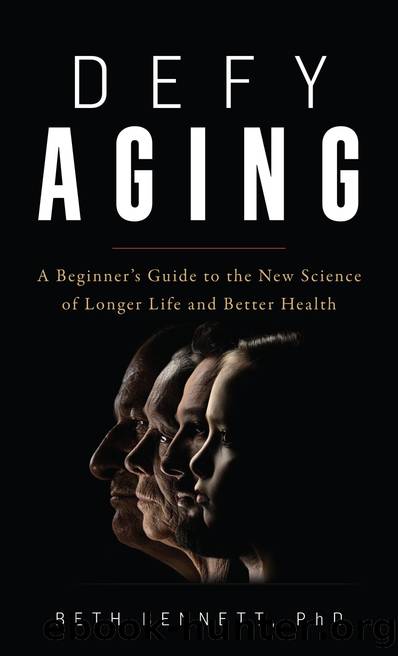Defy Aging by Beth Bennett

Author:Beth Bennett
Language: eng
Format: epub
Publisher: Rowman & Littlefield Publishers
Published: 2021-09-02T00:00:00+00:00
WHAT HAPPENS AS WE AGE?
We have all noticed that age-related changes in cognition are extremely variable. One person can recite long poems from memory or solve difficult mathematical problems at ninety-five years of age, whereas another will develop dementia at age fifty. There are many reasons for this, including overall health, education, socioeconomic status, and genetics. In most healthy older people, cognitive abilities donât decline much. In fact, the wisdom of accrued experience increases, and we can continue to learn new skills throughout life.4
Age-related changes in the brain have been studied for more than two centuries, but we still canât say much about what constitutes ânormalâ change. Much of the uncertainty is due to the difficulty of examining a brain in a living person. Recent advances in technology, such as the MRI, are changing this. The most obvious change is in brain weight, which is pretty stable until about midlife, then begins to decline. Brain volume, which correlates well with weight, drops 0.1â0.2 percent a year from thirty to fifty years, then falls off the cliff to 0.3â0.5 percent a year after the age of seventy.5
What Do We Lose? Scientists used to think that we lost more and more neurons as we aged. More recent studies found that, in general, neuron loss with age is either undetectable or relatively mild. Once you pass eighty years, though, all bets are off. After eighty, neurons are lost due to the processes that sometimes result in Alzheimerâs disease, which I discuss in more detail below. Neuron populations are also affected by cerebrovascular disease (i.e., damage to blood vessels, which I introduced in the previous chapter), which, of course, is also more common with age.
When neurons die, they are replaced with glial cells because, with some exceptions (read on to learn about these), we donât make new neurons as adults. Interestingly, the number of neurons in the brain stem remains fairly constant throughout life, perhaps because of the many regions in this part of the brain controlling vital physiological functions such as breathing and heart rate. The few places in the brain stem that do shrink with age are areas that, first, control the physiological response to stress and fear, and, second, produce dopamine, the so-called reward NT. A third region, the hippocampus, an important memory area in the middle of the brain, also shrinks with age.6 We can, therefore, expect some changes in behaviors affected by these areas. In the hippocampus, for example, with age-related shrinkage, memory can be impaired.
So, if we donât lose that many neurons as we get older, why do our brains get smaller? Turns out that individual neurons shrink. Specifically, dendrites are lost.7 Recall that dendrites are the branching portions of the neuron that âtalkâ to other neurons. In other words, most inputs to a neuron come through its dendrites. Remove this cross talk provided by dendrites, the neuron receives less information, and the system shrinks. Think about your cell phone connection: if some cell towers go offline, you canât make calls.
Download
This site does not store any files on its server. We only index and link to content provided by other sites. Please contact the content providers to delete copyright contents if any and email us, we'll remove relevant links or contents immediately.
The Body: A Guide for Occupants by Bill Bryson(5098)
The Longevity Diet by Valter Longo(5065)
Ikigai by Héctor García & Francesc Miralles(4275)
Limitless by Jim Kwik(3175)
The Checklist Manifesto by Atul Gawande(2855)
The Body by Bill Bryson(2626)
Memory Rescue by Daniel G. Amen(2426)
What Color Is Your Parachute? 2015 by Richard N. Bolles(2311)
Breath by James Nestor;(2311)
Becoming Myself by Irvin D. Yalom(2251)
Fat for Fuel by Joseph Mercola(2011)
Memory Rescue: Supercharge Your Brain, Reverse Memory Loss, and Remember What Matters Most by Amen Dr. Daniel G(1980)
Awakening Your Ikigai by Ken Mogi(1817)
The Daughter's Return by The Daughter's Return(1801)
Weight Training by Thomas Baechle(1775)
50 After 50 by Maria Leonard Olsen(1720)
Starting Over (Sugar Creek Romance ) by Jordan Silver(1691)
1610396766 (N) by Jo Ann Jenkins(1684)
Dirt by Bill Buford(1682)
